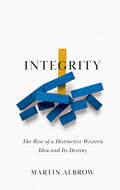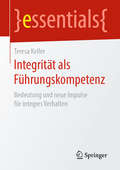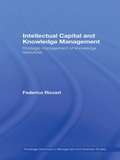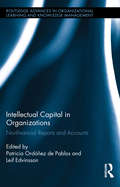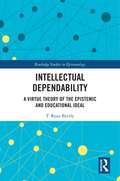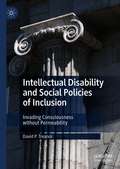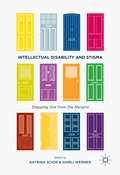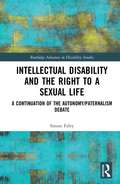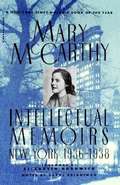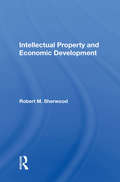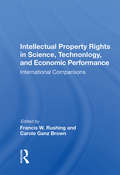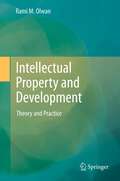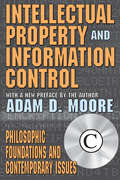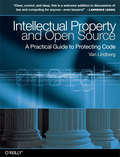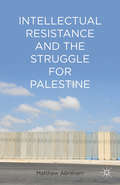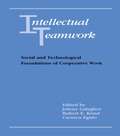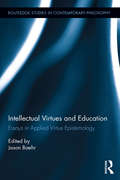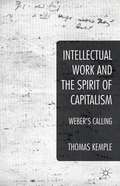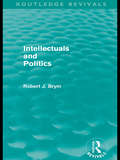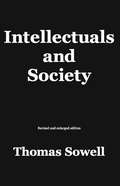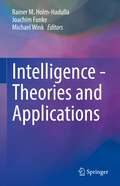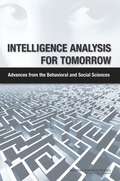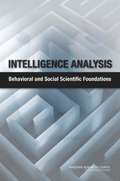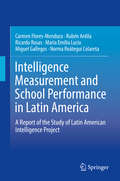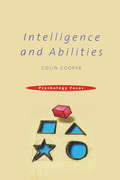- Table View
- List View
Integrity: The Rise of a Distinctive Western Idea and Its Destiny
by Martin AlbrowPublic life is dominated from time to time by media storms around integrity. The behaviour of elected political leaders has led many to decry the deterioration in standards and the lack of integrity in public life. But what is integrity, and where does our concern with integrity in public life come from? In this book, Martin Albrow argues that integrity has been an essential component of the rise of the West and a key feature that distinguishes the West from other civilizations. He traces the idea of integrity back to its roots in ancient Greece and Rome, where integrity acquired its special meaning: the unique feature of any object with integrity was that it combined its wholeness or completeness with the embodiment of standards that came from outside it. Integrity was unity through values. He then follows the story of integrity through early Christianity and the Renaissance to the present day. Today, we find ourselves in the paradoxical situation where the lack of integrity in public life is widely condemned while, at the same time, politicians can remain popular without even pretending to act with integrity: this is the new politics of the integrity vacuum. The idea of integrity may be a distinctively western one but, like many other aspects of western culture, it has now become a property of worldwide society. Albrow concludes by arguing that integrity could add more value today by being combined with non-western wisdom as we strive to create an order where honesty, trust and reliability in our relationships with others are paramount. This highly original account of an idea that lies at the heart of western culture will be of interest to anyone concerned about the state and future of our public life.
Integrität als Führungskompetenz: Bedeutung und neue Impulse für integres Verhalten (essentials)
by Teresa KellerIn diesem essential zeigt Teresa Keller, wie integres Verhalten entwickelt und dauerhaft aufrechterhalten werden kann. Die Autorin verdeutlicht die Bedeutung sowie Wirkung von Integrität und erläutert Faktoren wie Achtsamkeit, Haltung, Anstand und emotionale Intelligenz, die maßgeblich an Integrität beteiligt sind. Vor allem aber macht sie die Relevanz von Integrität als Führungskompetenz klar – zu oft wird Integrität als nachrangiges Führungs- und Unternehmensziel behandelt.
Intellectual Capital and Knowledge Management: Strategic Management of Knowledge Resources (Routledge Advances In Management And Business Studies)
by Federica RicceriIt is widely held that the successful management of knowledge resources within industry creates value. However, how this value is created is less clear. This book explores the management of knowledge resources in organisations. Several of the frameworks which have been created around the world to manage knowledge resources are examined and the book
Intellectual Capital in Organizations: Non-Financial Reports and Accounts (Routledge Advances in Organizational Learning and Knowledge Management #1)
by Leif Edvinsson Patricia OrdIn a global competitive economic environment, resources that are scarce or irreplicable are a source of sustained competitive advantage for companies and organizations. Knowledge-based resources are a major and increasing driver of long term competitive advantage. Most accounting standards however do not allow for knowledge-based resource calculations, including the most important of these, intellectual capital. Intellectual capital is the collective knowledge, documented and otherwise, of individuals in an organization. In the absence of accounting standards to numerically evaluate intellectual capital, some institutions have devised their own reports and statements. But why should companies, universities, and research centers measure these resources? How are intellectual capital statements built? How does one set targets, and what indicators should they include? This book reviews the development of the field of intellectual capital reporting, including core concepts, latest developments, the main components of intellectual capital, how a statement is built, and key indicators of each component. It further analyzes experiences from a variety of pioneering companies and institutions around the globe in measuring intellectual capital, including case studies from educational and research institutions, and provides crucial transnational comparisons. Authors Ordóñez de Pablos and Edvinsson examine the challenges and next steps for the harmonization of intellectual capital reports, consider the creation of a special international agency for intellectual capital reporting standards, and evaluate the weaknesses of current standards and how they might be overcome.
Intellectual Dependability: A Virtue Theory of the Epistemic and Educational Ideal (Routledge Studies in Epistemology)
by T. Ryan ByerlyIntellectual Dependability is the first research monograph devoted to addressing the question of what it is to be an intellectually dependable person—the sort of person on whom one’s fellow inquirers can depend in their pursuit of epistemic goods. While neglected in recent scholarship, this question is an important one for both epistemology—how we should conceptualize the ideal inquirer—and education—how we can enable developing learners to grow toward this ideal. The book defends a virtue theory according to which being an intellectually dependable person is distinctively a matter of possessing a suite of neglected virtues called "the virtues of intellectual dependability" that are themselves distinctively concerned with promoting epistemic goods in others’ inquiries. After defending the existence and educational significance of these virtues as a group, the book turns toward the project of identifying and conceptualizing several specific instances of these virtues in detail. Virtues discussed include intellectual benevolence, intellectual transparency, communicative clarity, audience sensitivity, and epistemic guidance. In each case, an interdisciplinary treatment of the nature of the virtue and its relationship to other virtues, vices, and personality features is offered, drawing especially on relevant research in Philosophy and Psychology. The book concludes with a chapter devoted to identifying distinctive ways these virtues of intellectual dependability are manifested when it is inquiring communities, rather than individuals, that occupy the position of intellectual dependence. By directing attention to the ideal of intellectual dependability, the book marks a novel turn of scholarly interest explicitly toward a neglected dimension of the ideal inquirer that will inform both epistemological theorizing and educational practice.
Intellectual Disability and Social Policies of Inclusion: Invading Consciousness without Permeability
by David P. TreanorThis book explores why, after forty years of funded policies of social inclusion, persons living with an intellectual disability are still separated from the social fabric of neoliberal societies. David Treanor shows how the nature of the reform process is driven unnecessarily by the economic neoliberal paradigm, the cultural misconceptions of intellectual disability, and the inattention accorded to personal relationships between persons living with and without an intellectual disability. Treanor utilizes John Macmurray’s personalist philosophy, Julia Kristeva’s ontology of disability and Michele Foucault’s concept of bio-power to explain this phenomenon. The concepts in this book challenge current approaches to social inclusion and have radical implications for future practices.
Intellectual Disability and Stigma
by Katrina Scior Shirli WernerThis book examines how intellectual disability is affected by stigma and how this stigma has developed. Around two per cent of the world's population have an intellectual disability but their low visibility in many places bears witness to their continuing exclusion from society. This prejudice has an impact on the family of those with an intellectual disability as well as the individual themselves and affects the well-being and life chances of all those involved. This book provides a framework for tackling intellectual disability stigma in institutional processes, media representations and other, less overt, settings. It also highlights the anti-stigma interventions which are already in place and the central role that self-advocacy must play.
Intellectual Disability and the Right to a Sexual Life: A Continuation of the Autonomy/Paternalism Debate (Routledge Advances in Disability Studies)
by Simon FoleyOne of the perennial political/philosophical questions concerns whether it is ever justifiable for a third party to paternalistically restrict an adult’s freedom to ensure their own, or society’s, best interests are protected. Wherever one stands on this debate it remains the case that, unlike their non-impaired contemporaries, many intellectually disabled adults are subjected to a paternalistic regime of care. This is particularly the case regarding members of this population exercising more control of their sexuality. Utilizing rare empirical data, Foucault's theory of power and Kristeva’s concept of abjection, this work shows that many non-disabled people – including family members – hold ambivalent attitudes towards people with visible disabilities expressing their sexuality. Through a careful examination of the autonomy/paternalism debate this is the first book to provide an original, provocative and philosophically compelling analysis to argue that where necessary, facilitated sex with prostitutes should be included as part of a new regime of care to ensure that sexual needs are met. Intellectual Disability and the Right to a Sexual Life is essential reading for scholars, students and policy-makers with an interest in philosophy, sociology, political theory, social work, disability studies and sex studies. It will also be of interest to anybody who is a parent or a sibling of an adult with an intellectual disability and those with an interest in human rights and disability more generally.
Intellectual Memoirs: New York, 1936-1938
by Mary MccarthyMary McCarthy vividly recalls her early years in New York before she began writing novels and stories. At that time, she wrote reviews for the Nation and the New Republic, was active in the American Communist Party, and was married to activist actor/playwright Harold Johnsrud.
Intellectual Property And Economic Development
by Robert M SherwoodSpeaking very roughly, countries with advanced economies tend to be those displaying intellectual property protection systems in which the public has a basic degree of confidence. Those systems, when they are thought about at all rather than taken for granted, are thought of as reasonably effective in safeguarding innovation and creative expression
Intellectual Property Rights In Science, Technology, And Economic Performance: International Comparisons
by Francis W. Rushing Carole Ganz BrownThis book discusses the economic, political, legal, and social concerns of the world's governments on intellectual property rights. It analyzes the systems of both developed and developing economies and draws a clear picture of the status of intellectual property regimes around the world.
Intellectual Property and Development
by Rami M. OlwanThe book examines the correlation between Intellectual Property Law - notably copyright - on the one hand and social and economic development on the other. The main focus of the initial overview is on historical, legal, economic and cultural aspects. Building on that, the work subsequently investigates how intellectual property systems have to be designed in order to foster social and economic growth in developing countries and puts forward theoretical and practical solutions that should be considered and implemented by policy makers, legal experts and the Word Intellectual Property Organization (WIPO).
Intellectual Property and Information Control: Philosophic Foundations and Contemporary Issues
by Adam MooreComputer technology and the proliferation of digital networks have radically altered how ideas and information are gathered and manipulated and generated new conflicts between public use and private rights. These conflicts raise serious problems: Are abstract ideas and information proper subjects of ownership? What role should privacy rights play? How does the violation of intellectual property rights compare morally to the violation of physical property rights? Now available in paperback, Intellectual Property and Information Control provides answers and strategies for dealing with these and other questions while mounting a philosophical defense of rights to intellectual and intangible property.As the book shows, a policy that allows too much access may stymie innovation and cause individuals to isolate themselves. At the other extreme, huge, multinational corporations may hold as intangible property vast amounts of knowledge, including sensitive personal information. Through discussions of patent law, fair use, and practical problems such as privacy in the workplace, Moore demonstrates that intellectual and intangible property rights exist along with privacy rights. The latter will sometimes constrain what can be done with the former.
Intellectual Property and Open Source: A Practical Guide to Protecting Code
by Van Lindberg"Clear, correct, and deep, this is a welcome addition to discussions of law and computing for anyone -- even lawyers!"-- Lawrence Lessig, Professor of Law at Stanford Law School and founder of the Stanford Center for Internet and SocietyIf you work in information technology, intellectual property is central to your job -- but dealing with the complexities of the legal system can be mind-boggling. This book is for anyone who wants to understand how the legal system deals with intellectual property rights for code and other content. You'll get a clear look at intellectual property issues from a developer's point of view, including practical advice about situations you're likely to encounter.Written by an intellectual property attorney who is also a programmer, Intellectual Property and Open Source helps you understand patents, copyrights, trademarks, trade secrets, and licenses, with special focus on the issues surrounding open source development and the GPL. This book answers questions such as:How do open source and intellectual property work together?What are the most important intellectual property-related issues when starting a business or open source project?How should you handle copyright, licensing and other issues when accepting a patch from another developer?How can you pursue your own ideas while working for someone else?What parts of a patent should be reviewed to see if it applies to your work?When is your idea a trade secret?How can you reverse engineer a product without getting into trouble?What should you think about when choosing an open source license for your project?Most legal sources are too scattered, too arcane, and too hard to read. Intellectual Property and Open Source is a friendly, easy-to-follow overview of the law that programmers, system administrators, graphic designers, and many others will find essential.
Intellectual Resistance and the Struggle for Palestine
by M. AbrahamBy positioning the late Edward Said's political interventions as a public intellectual on behalf of Palestinian populations living under Israeli occupation as a form of intellectual resistance, Abraham moves to consider forms of physical resistance, seeking to better understand the motivations of those who choose to turn their bodies into weapons.
Intellectual Teamwork: Social and Technological Foundations of Cooperative Work
by Robert E. Kraut Jolene Galegher Carmen EgidoThis book seeks to establish an interdisciplinary, applied social scientific model for researchers and students that advocates a cooperative effort between machines and people. After showing that basic research on social processes offers much needed guidance for those creating technology and designing tools for group work, its papers demonstrate the mutual relevance of social science and information system design, and encourage better integration of these disciplines. This comprehensive collection closely examines the variety of electronic tools being deployed to solve traditional problems in communication and coordination. Unfortunately, research shows that these tools have not been as successful as their designers had envisioned, partially because they were not always produced with the needs and goals of their human users in mind. The editors' goal is to entice more social scientists to orient their research around questions of practical interest to information system designers and to convince designers to search for the knowledge about social and organizational behavior that would make their tools more useful.
Intellectual Virtues and Education: Essays in Applied Virtue Epistemology (Routledge Studies in Contemporary Philosophy)
by Jason BaehrWith its focus on intellectual virtues and their role in the acquisition and transmission of knowledge and related epistemic goods, virtue epistemology provides a rich set of tools for educational theory and practice. In particular, characteristics under the rubric of "responsibilist" virtue epistemology, like curiosity, open-mindedness, attentiveness, intellectual courage, and intellectual tenacity, can help educators and students define and attain certain worthy but nebulous educational goals like a love of learning, lifelong learning, and critical thinking. This volume is devoted to exploring the intersection between virtue epistemology and education. It assembles leading virtue epistemologists and philosophers of education to address such questions as: Which virtues are most essential to education? How exactly should these virtues be understood? How is the goal of intellectual character growth related to other educational goals, for example, to critical thinking and knowledge-acquisition? What are the "best practices" for achieving this goal? Can growth in intellectual virtues be measured? The chapters are a prime example of "applied epistemology" and promise to be a seminal contribution to an area of research that is rapidly gaining attention within epistemology and beyond.
Intellectual Work and the Spirit of Capitalism
by Thomas KempleThis book treats three lectures that Weber gave in the last decade of his career as a podium or prism from which to approach his best-known treatises and essays on the rise of occidental capitalism. His remarks on 'Technology and Culture' (1910) and his famous 'Science as a Vocation' (1917) and 'Politics as a Vocation' (1919 lectures) offer a standpoint for assessing the contemporary relevance of Weber''s notion of ''interpretive understanding'', including the place of ideal types and value-judgments in sociology, as well as the use of rhetorical techniques and literary methods in scholarly discourse more generally. These public moments invite us to consider how both his most celebrated and least known arguments about the origins of the ''spirit'' of modern capitalism and the fateful force of bureaucracy continue to raise questions about the prospect and promise of intellectual work that still concern us today.
Intellectuals and Politics (Routledge Revivals #Vol. 9)
by Robert BrymThis essay, first published in 1980, analyses the relationship between intellectuals’ social locations and their political orientations. Dr Brym provides a critical discussion of the various sociological views of intellectuals and specifies some of the social conditions which encourage intellectuals to follow various directions on the political compass. He also demonstrates that intellectuals are neither socially rootless nor tied to one particular class or group within society, concluding that it is only by an analysis of intellectuals’ mobility patterns that we can hope to arrive at an adequate understanding of their politics. Clearly written, and assuming only a basic grounding in sociological theory, this book will thus be of special interest to students of political sociology, social movements, the sociology of knowledge, the sociology of culture and the sociology of intellectuals.
Intellectuals and Society
by Thomas SowellHow intellectuals as a class affect modern societies by shaping the climate of opinion in which official policies develop--on issues ranging from economics to law to war and peace
Intelligence - Theories and Applications
by Michael Wink Joachim Funke Rainer M. Holm-HadullaIntelligence allows people to understand events and to shape their surrounding environment. This book delves deeper into the theories and applications of intelligence, showing it is a multifaceted concept —defined and explained differently by prestigious experts of various disciplines in their own research. The book provides interdisciplinary connections of intelligence as it relates to a variety of clearly outlined subject areas, and should lead to a deep understanding of the phenomenon as it pertains to practical applications in different domains. Contributors in this volume present results from evolutionary biology, mathematics, artificial intelligence, medicine, psychology, cultural studies, economy, political sciences and philosophy. Individual scientific models are integrated in an interdisciplinary concept of wisdom. This volume will help enhance the common understanding of intelligence for fellow researchers and scientists alike.
Intelligence Analysis for Tomorrow: Advances from the Behavioral and Social Sciences
by National Research Council of the National AcademiesThe intelligence community (IC) plays an essential role in the national security of the United States. Decision makers rely on IC analyses and predictions to reduce uncertainty and to provide warnings about everything from international diplomatic relations to overseas conflicts. In today's complex and rapidly changing world, it is more important than ever that analytic products be accurate and timely. Recognizing that need, the IC has been actively seeking ways to improve its performance and expand its capabilities. In 2008, the Office of the Director of National Intelligence (ODNI) asked the National Research Council (NRC) to establish a committee to synthesize and assess evidence from the behavioral and social sciences relevant to analytic methods and their potential application for the U.S. intelligence community. In Intelligence Analysis for Tomorrow: Advances from the Behavioral and Social Sciences, the NRC offers the Director of National Intelligence (DNI) recommendations to address many of the IC's challenges. Intelligence Analysis for Tomorrow asserts that one of the most important things that the IC can learn from the behavioral and social sciences is how to characterize and evaluate its analytic assumptions, methods, technologies, and management practices. Behavioral and social scientific knowledge can help the IC to understand and improve all phases of the analytic cycle: how to recruit, select, train, and motivate analysts; how to master and deploy the most suitable analytic methods; how to organize the day-to-day work of analysts, as individuals and teams; and how to communicate with its customers. The report makes five broad recommendations which offer practical ways to apply the behavioral and social sciences, which will bring the IC substantial immediate and longer-term benefits with modest costs and minimal disruption.
Intelligence Analysis: Behavioral and Social Scientific Foundations
by National Research Council of the National AcademiesThe U.S. intelligence community (IC) is a complex human enterprise whose success depends on how well the people in it perform their work. Although often aided by sophisticated technologies, these people ultimately rely on their own intellect to identify, synthesize, and communicate the information on which the nation's security depends. The IC's success depends on having trained, motivated, and thoughtful people working within organizations able to understand, value, and coordinate their capabilities. Intelligence Analysis provides up-to-date scientific guidance for the intelligence community (IC) so that it might improve individual and group judgments, communication between analysts, and analytic processes. The papers in this volume provide the detailed evidentiary base for the National Research Council's report, Intelligence Analysis for Tomorrow: Advances from the Behavioral and Social Sciences. The opening chapter focuses on the structure, missions, operations, and characteristics of the IC while the following 12 papers provide in-depth reviews of key topics in three areas: analytic methods, analysts, and organizations. Informed by the IC's unique missions and constraints, each paper documents the latest advancements of the relevant science and is a stand-alone resource for the IC's leadership and workforce. The collection allows readers to focus on one area of interest (analytic methods, analysts, or organizations) or even one particular aspect of a category. As a collection, the volume provides a broad perspective of the issues involved in making difficult decisions, which is at the heart of intelligence analysis.
Intelligence Measurement and School Performance in Latin America: A Report of the Study of Latin American Intelligence Project
by Carmen Flores-Mendoza Rubén Ardila Ricardo Rosas María Emilia Lucio Miguel Gallegos Norma Reátegui ColaretaThis book presents the results of the most complete and updated assessment of cognitive resources of students in Latin America: the Study of Latin American Intelligence (SLATINT). During four years, top researchers of the region used a standardized set of cognitive measures to assess 4,000 students aged between 14 and 15 years from six countries: Brazil, Argentina, Mexico, Chile, Colombia and Peru. The data collected and now analyzed in this volume is a first step to understand the human cognitive capital of the region, a crucial resource for any country today. Intelligence research has shown that the cognitive skills of a population are strongly associated with the school performance of its students and the development of a nation. This makes Intelligence Measurement and School Performance in Latin America a valuable tool both for Latin American researchers and authorities engaged in the improvement of each country’s human resources and for psychologists, educators and other social scientists dedicated to the study of the impact of intelligence in the development of nations.
Intelligence and Abilities
by Colin CooperResearch into abilities is one of the great success stories of psychology. Ability tests are widely used and there is continued interest in the origins of abilites (enes or environment?) and their links to social phenomena such as crime and welfare dependecy. Intelligence and Abilities explains what is known about the processes associated with mental abilities and the relationship of abilities to behaviour. It also provides a clear and up-to-date guide to the main areas of research.
